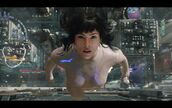This is a very, very, very irresponsible brain (hu) hole (che). Don’t take it seriously and don’t think too much about your friends and neighbors, you see.
I think the translator in my country may understand the gist of the film better than the original screenwriter.
At the end of the film, the government represented by Aramaki asked the proletariat represented by Major Motoko Kusanagi, "Do you allow me to kill the cartel?" Motoko Kusanagi said, "I do." Actually, the English name of Cartel, the head of the villainous Hanka Company, is Cutter. I once thought that its original name was really "Cartel."
Why do I think it's more fun to be called Cartel?
The first is the setting of Motoko Kusanagi herself. Suzi's family background is not good; it can be said to be lower class. From what Suzi's mother said, "She often makes remarks that technology will destroy the world." It can be seen that Suzi has a negative attitude towards technology.The development of science and technology in the past 20 years, especially the development of Internet technology, has fully proved that technology has widened the gap between the rich and the poor (for details, please refer to Saving Capitalism: For the Many, Not the Few, written by Robert Reich). Technology may mean more to the rich than to the poor.For example, because of the existence of the Internet, every move of the rich can naturally get more attention. Why are WeChat public accounts desperately accumulating fans? In order to monetize traffic, attention itself is valuable. Although I don't know what Motoko's background is (that part completely turned into a romance), from what she did, it can be seen that at least she is also a victim of technology, and in the end, she can only follow the same view. Friends huddled together to keep warm, and they were robbed by the villain and made into prosthetic bodies.
Didn't the Hanka Company arrest people and conduct experiments without first conducting a political inspection? Suzi firmly believes in the guilt of technology, and even fitted her with a prosthetic limb. Does this really not produce a rejection reaction? The tragedy of being killed is simply self-inflicted.
Second, cartels are an important form of monopoly. Its main purpose is to limit the output of its members to raise prices and obtain excess profits. The most typical representative is the Organization of Petroleum Exporting Countries (OPEC). Cartels emerged alongside capitalism, particularly after World War I, and thrived in capitalist powers before evolving into state monopoly capitalism.In this film, the Hanka Company kills innocent people indiscriminately, makes war machines by unscrupulous means, and obtains huge profits, showing the bloody primitive accumulation process of capitalism.
In the process of working for the monopoly technology company, Motoko gradually awakens, discovers his past identity, and unites with other proletarians (pay attention, the translation translates Michael Pitt's original name of Kuze as a hero; he is the first awakening and the person who constantly guides Motoko to find the truth;but don't forgetthat Kuze kills innocent people indiscriminately in order to prolong his life.Is he different from Hanka Company?The film conceals Kuze's ethical dilemma through a more intense and intuitive description of the villain) and the government, which wiped out the bourgeoisie headed by the cartels. I want to see this Hollywood remake as a beautiful vision. After all, the gap between the rich and the poor in American society is also unimaginably large, and Trump, who is still among the top bourgeois, is still in power...
Well, the brain (hu) hole (che) ends here. It's all nonsense. Don't take it seriously. After all, it's called Cutter.I am a serious dividing line (who believes)
Personally, I think that the 2017 version of the remake has a place to explore—the dualism of soul and body.
Mila (I thank the screenwriter for giving her a new name) has a real human brain and the rest is made up of machines, so Mila doesn't have human senses, she can't feel pain due to the presence of a brain, she is moral and emotional.So, is Mira still human?
The film gave an affirmative answer and emphasized at the end of the film, "My heart belongs to human beings, and my body is mechanical." Our humanity is a virtue. " Put yourself into the family of people.The fundamental reason she thinks so is that I have a brain. This is a God-given gift other than righteousness. Because of the existence of this brain, she has free will and subjective initiative (here I ignore the contradiction between Mira as the first person who leads the perfect combination of human brain and prosthesis and the pessimism of technology in the whole film).
The most famous proponent of the dualism of body and soul, René Descartes (the Cartesian coordinate system), believed that all non-human animals were machines.Why are humans not machines? Because human beings are dualistic "We have physical physical objects, like animals, but, unlike objects, we are not physical in nature." We are invisible minds with physical objects.Our minds occupy physical objects, inhabit them, and form close connections with them. Descartes'most famous argument is "I think therefore I am." I know that I am a substance, the essence or nature of a thinking subject, and the existence of this thinking subject does not require any space, nor does it depend on any tangible object. This shows that my soul, my essence, is completely different from my body. In Descartes' time, people did not know where the "soul" came from, and in the film, Mira named her ghost (Ghost). attached to an entity-the brain. This is very much in line with the setting of our current era, because perhaps the biggest problem in biology now is to break through the essence of the brain. We still don't know what the brain is.However, the film ignores the fact that the brain is also an objective existence composed of neurons. The brain is not "divine". One day, since we can make prosthetic limbs, we may be able to perfectly replicate the human brain (the so-called artificial intelligence).
This separation of the rest of the body from the brain can be called the modern dualism of soul and body.Descartes did not know the existence of the brain, so he believed that man is man, and man is the mind of man. We know that brains exist, so we think it's people who have human brains.After that, how do we define people?
This leads to the biggest loophole in the logic of the film.Mila emphasizes that "we think it is our memory that defines who we are, but it is our actions."But contrary to what Mila emphasized, Mila's behavior is exactly what we do. fueled by the memories she accumulated during her prime, which came from her previous brain.It is precisely because she has previous memories that she is different from the so-called weapons. She is not ordered by the company, and she is essentially a prime minister. So the central turning point of the film comes from the moment Juliette Binoche, played by Professor Olay, gives Mila the original memory.But if Mila has no previous memories, is she still human? Without memory, there would be no subsequent "awakening" and "rebellion", let alone inhumanity.
So at this point, I personally think that the core of the 2017 version of "Ghost in the Shell" is that it is not our brains that define us as people, but our memories, the memories we think are "real". But the film refutes this point of view through the words of Mira and Motoko.
I'm the dividing line that finally finished bullshitting (who believes). I gave this film three stars, not because of its unclear theme nor because I didn't want to compare it to the 1995 animated version (I might be pissed off if I thought about it).Just because being a Hollywood popcorn movie didn't make me feel good at midnight.This is very strange. Generally, Hollywood's routine will make people feel comfortable watching it and will make the audience consciously substitute into the psychological state of the protagonist, but this film does not. It may be because the situation setting is too similar to the animated version, so the visual effects did not surprise me (would it be better if I hadn't seen the 1995 version?) In addition, the soundtrack is very repetitive, and the story is not too long. It just makes me feel more and more sleepy.I really don't like the argument that technology has eliminated the uniqueness of human beings. After all, the development of science and technology is an inevitable result, and what must happen should be accepted happily.Maybe it's because I'm too sleepy, so I don't think I can correctly understand the main theme of the 2017 live-action version, and my understanding is superficial. The above 2000 words are all nonsense when I wait for the electric water heater to turn on.However, I think one thing is very good. This film fully proves that the dog person headed by Bart and the cat person headed by Motoko can fight side by side on a united front! As a dog person, seeing the cat in the goddess's house is so cute and has a great impact on my values. It is also good to be a cat person!
View more about Ghost in the Shell reviews










